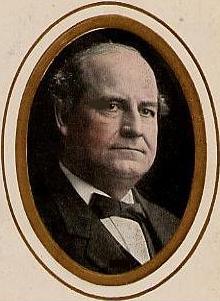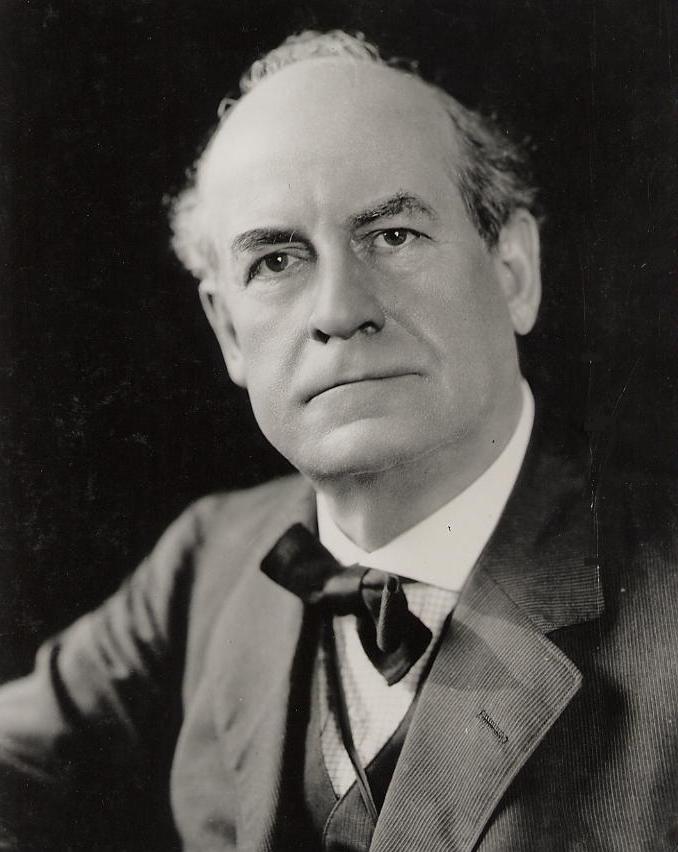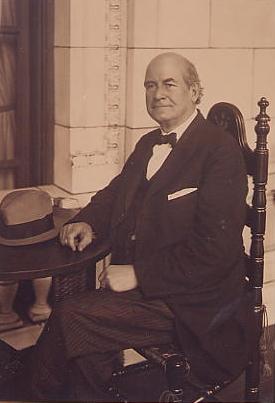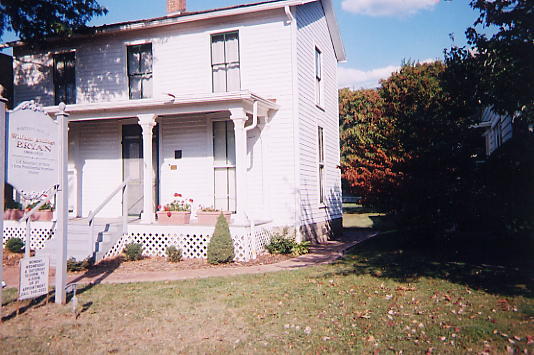|
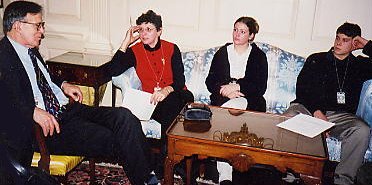 |
|
| DIPLOMATIC
HISTORY -- Bryan relatives listen as David Patterson (left), chief
historian at the State Department, describes Bryan's peace
initiatives in the Secretary of State's conference room on January
19. |
A Warrior for Peacekeeping
Throughout
his life, Bryan crusaded for world peace.
By religious conviction, he was a pacifist, although he gained a
commission in the Spanish-American War.
By 1905, Bryan helped advance a peaceful resolution to the
Russo-Japanese War by meeting with leaders and delivering a proposal for
arbitration in a speech before the Inter-Parliamentary Union (IPU) in
London, while on a world tour. Bryan’s
ideas were adopted by President Teddy Roosevelt who later won the Nobel
Peace Prize for his successful mediation of the Russo-Japanese War at the
Portsmouth Conference later that same year (1905). Note:
Bryan’s daughter, Ruth Bryan Owen (1885-1954), who later became the
first woman from Florida to serve in the U.S. House of Representatives,
also spoke before
the IPU and carried her
father’s legacy as a delegate to the San Francisco Conference
which
established the United Nations after World War II). Bryan’s
work as Secretary of State also helped form the conceptual pillars for
what later became President Wilson’s crusade
for America’ participation in the League of Nations.
At this juncture in America’s history, at the turn of the new millennium, with many parallels in issues facing the country (particularly cartels, monopolistic/political corruption, agricultural crisis, and concerns over the character of U.S. engagement in world affairs), it may be fitting to recognize the life and legacy of William Jennings Bryan.
|
|
|
|
Swords to Plowshares:
Righteous Warrior for Peace
Bryan's tireless campaigning for peace was rewarded in 1912 when
president-elect Woodrow Wilson named "The Great Commoner" as
Secretary of State. Bryan immediately began implementing plans for an
international peacekeeping mechanism based upon arbitration. At
bilateral signing ceremonies with nations which agreed to arbitrate
conflicts, Bryan presented a small, metal-sculpted form depicting a melding
of sword and plowshare. The presentation reflected Bryan's
agrarian/populist sentiments that peoples of the world would choose
peacekeeping over conflict if governments could be restrained.
In Washington's "real politik" circles, particularly among so-called "great power nation" diplomats who were maneuvering for influence as Europe moved closer to World War I, Bryan was regarded with humor. As the winds of the terrible conflict blew stronger, Bryan labored frenetically to keep the United States neutral and out of war. He also played an important role in hemispheric relations, particularly with South America and Mexico.
When Wilson tilted against Germany and its policy of unrestricted submarine warfare, Bryan became one of the only secretaries of state in U.S. history to resign over principle. But when Wilson took the country into World War I, Bryan gave his unstinting political support and later campaigned for the League of Nations. A careful review of Bryan's term at the Department of State raises the question: What would the 20th century have looked like if "The Great Commoner" had succeeded in keeping the United States out of Europe's conflict?
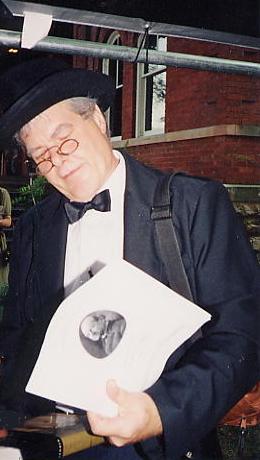 | |
|
THE GENUINE ARTICLE --
Bryan
re-enactor, Terry Gill, peruses WJBRP
descriptive material outside Rhea County Courthouse during the 75th
Annual Scopes Festival in Dayton, Tennessee (July 2000).
|
Recent
Developments
The
newly-launched WJBRP stepped out smartly at the 75th Anniversary Festival
of the Scopes Trial (July 14-15) in Dayton, Tennessee. ABC president
Nick Hollis spoke before an audience at Bryan College which included
direct descendents of "The Great Commoner," authors and other
experts from all over the country. Hollis later addressed a seminar
held in the Rhea County courtroom where the infamous "monkey
trial" was held. The event/s generated considerable media
coverage, including WGN-Radio/Chicago and the Knoxville
News-Sentinel which quoted Hollis' remarks. Numerous WJBRP
enrollment forms and project descriptions were distributed. Several
Bryan relatives signed up on the spot, and a number of web-link agreements
were conducted. In his talk, Hollis emphasized Bryan's extraordinary
contributions to America's political, diplomatic, and social history as a champion of
many pivotal causes including women's suffrage, direct election of
senators, anti-trust/monopoly legislation, farmer/worker rights and
international peacekeeping.
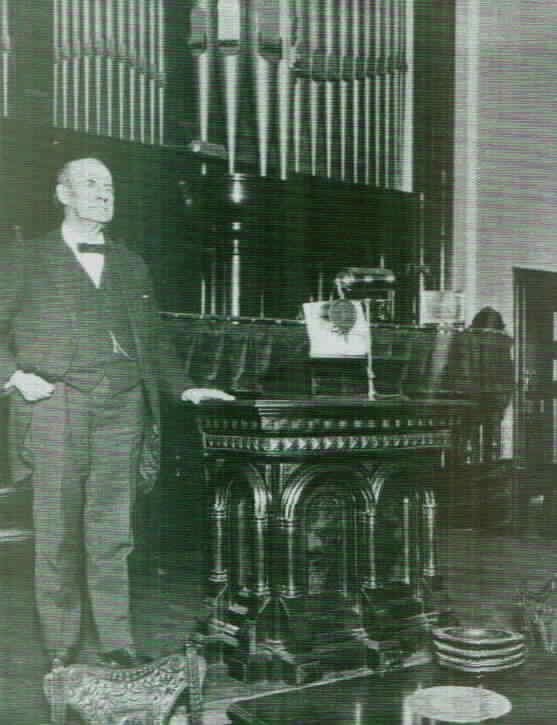 | |
|
EARLY
RADIO CONVERT – The
great commoner, William Jennings Bryan, as he appeared when his
sermon was broadcast by KDKA from Point Breeze Presbyterian Church in
Pittsburgh (March 12, 1922).
|
Bryan Link with
Jennings Randolph
William Jennings
Bryan was an accomplished political leader in 1902, when he visited his
friend Ernest Randolph in Salem, West Virginia, and inquired whether
Randolph had named his newborn son. As
the story goes, Bryan suggested that Randolph namesake the infant after
him. This is how “Jennings” Randolph, a famous political leader,
statesman, and humanitarian from West Virginia, got his name as well as
the roots of a great political legacy which he burnished brilliantly with
his life and achievements – many of which resonated on themes Bryan had
pioneered. As “Father of
the 26th Amendment” giving 18-20 year-olds the vote, Randolph
linked much of his long legislative efforts toward peacekeeping and
creating the framework for enlightened citizenship and environmental
stewardship. After retiring
from the United States Senate following his fourth term in 1985, Randolph
chaired The Agribusiness Council (ABC) and its international affiliate,
Agri-Energy Roundtable (AER).
Political Legacy
Bryan's contributions to American political and social history far
exceed most presidents. For example, Bryan is credited with early
championing of the following: (1) graduated income tax (16th Amendment),
(2) direct election of U.S. senators (17th Amendment), (3) women's
suffrage (19th Amendment), (4) workmen's compensation, (5) minimum wage,
(6) eight-hour workday, (7) Federal Trade Commission, (8) Federal Farm
Loan Act, (9) government regulation of telephone/telegraph and food
safety, (10) Department of Health, (11) Department of Labor, and
(12) Department of Education.
Many of Bryan's efforts in 1900 focused on campaign finance reform and curbing abuses of business trusts and monopolies. Many of these themes resonate today (see The New York Times, August 20, 2000 (Op-Ed) Week in Review, page 15, article by John B. Judis, which describes comparisons to William Jennings Bryan's campaign of 1896, but fails to note key similarities between 1900 and 2000 election issues). In 1902, Bryan played a important role helping President Teddy Roosevelt rein in business abuses and corruption.
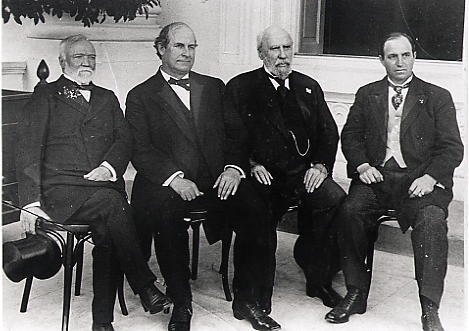 |
|
BRYAN AND THE
BARONS: A TURNING POINT IN U.S. INDUSTRIAL HISTORY -- “The Great
Commoner” is flanked by steel magnate Andrew Carnegie (left) and
Railroad builder James J. Hill (right), with labor leader John
Mitchell (2nd from right) during the famous White House conference (October 2, 1902).
President Roosevelt convened many leaders and others to
arbitrate a massive coal strike which threatened both the Nation’s
industrial engine and a citizenry dependent on coal for heat.
Bryan cooperated with Roosevelt to curb big business and
usher in a more progressive era for American farmers and workers.
|
|
| |
|
ANOTHER
PEREGRINATING JENNINGS? --
Bryan rarely sat still for the cameras, traveling and
campaigning
for more than thirty years. This photo was taken in Dayton,
Tennessee where Bryan participated at the Scopes Trial (July
1925). Days later, he died in his sleep. (Bryan's mother
was Mariah Elizabeth
Jennings, whose family migrated to Illinois from
Kentucky. His father, Silas, was a native of Point Pleasant,
[West] Virginia and Culpeper, Virginia.) |
|
|
|
| BRYAN BIRTHPLACE--This two story
frame house in Salem, Illinois witnessed the birth of William
Jennings Bryan in 1860. His father, Silas Lillard Bryan, was a
native of Virginia, while Mariah Elizabeth Jennings' (1834-1896)
family traced from Kentucky,
Ohio and Southampton, New York. |
|
Objectives/Aims
The William
Jennings Bryan Recognition Project will provide a platform to chronicle
and memorialize Bryan’s contributions to history, American politics and
international peacekeeping. Programs will be
blending with ongoing efforts of the Jennings Randolph Recognition Project
(JRRP) and the
Jennings Heritage Project (JHP), and focused on generating interest in
history and civics, particularly among young people. The program/lecture
series will be nonpartisan in nature.
Expectations
The Bryan Project will generate positive insights for
scholars and individuals interested in elevating the legacy and
ideals of William Jennings Bryan between the
centennial anniversaries of the elections of 1900 and 1908. Coupled with
this approach will be a review of key issues which comprise Bryan’s legacy
and which shadow our history across the 20th century reaching into our
present-day current events. The Bryan Project will provide a history
“window” on what the world was like a century ago with analysis of a
complex weave of issues which dominated Bryan’s era (see
America's Long
Walk Home: Revisiting Bryan's Campaign of 1908).
Method of Operation
The William Jennings
Bryan Recognition Project (WJBRP) is achieving its objectives through a
lecture series, research and memoranda/report circulation focused on the
issues, life and time of Bryan with links to the present.
Research will be coordinated with leading Bryan scholars,
universities, and institutions where Bryan’s life is still remembered
– and supervised by a trained historian with advanced degree education
and public policy experience (see Publications,
"Bryan and Randolph: Politics, Honor, and Election 2000,"
September 18, 2000, Salem, West Virginia and
a
second publication "Swords to Plowshares: Rural Origins of William
Jennings Bryan - An Unheralded Secretary of State, 1913-15, April 9,
2002, Department of State Historians' Roundtable, Washington, D.C).
In July 2008, William Jennings Bryan Project authored an article, "America's Long Walk Home: Revisiting the Campaign of 1908," which was published with photographs in The Fredericksburg Freelance Star and picked up by a major news syndicate, then reprinted in dozens of newspapers around the country. The piece featured Bryan, noting parallels with the Presidential Campaign of 2008. Online links to the article were carried worldwide -- especially in Philippines, India, and Great Britain -- countries Bryan visited in his international tour in 1905-06.
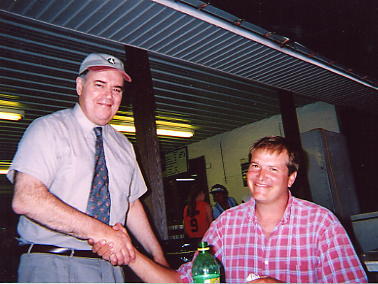 |
|
| JENNINGS COUNTY FAIR --
Nick Hollis visits with farm leaders across rural America; pictured
here in Indiana with Nathan Burbrink. Project contributors include
Marion Jennings and Mary Jennings Eaton. |
Supporters
The WJBRP is
enlisting financial support from individuals and foundations known to be
interested in William Jennings Bryan and his legacy on a range of key
issues over the years. Among the early supporters are Larry Gray (great
grandson), Helen Hicks (great grand-daughter), Joyce Bryan Strout (great
cousin), B. & N. Heuermann Foundation, Robert Coleman, Rosey Dow,
Fred Whitehouse, David V. Lightfoot MD, Jeff Jennings, and others.

Contributions to the William
Jennings Bryan Recognition Project
(WJBRP)
are tax-deductible under IRS Code 501(c)(3) with checks payable
to:
The Agribusiness Council -
WJBRP
P.O. Box 5565
Washington DC 20016
Questions may be directed to the project secretariat at:
Tel: (202) 296-4563
"Statesman,
yet friend to truth, of soul sincere,
in action faithful, and in honor clear"
"Burn down your cities and leave our farms and your cities will spring up again as if by magic. But destroy our farms and grass will grow in the streets of every city in this country... Having behind us the producing masses of this country and of the world supported by the commercial interest and the other toilers everywhere...we will answer their demand for a gold standard by saying to them 'you shall not press down upon the brow of labor this crown of thorns. You shall not crucify mankind upon a cross of gold.'"
(Cross of Gold Speech, William Jennings Bryan, July 9, 1896, Democratic National Convention, Chicago, Illinois)
